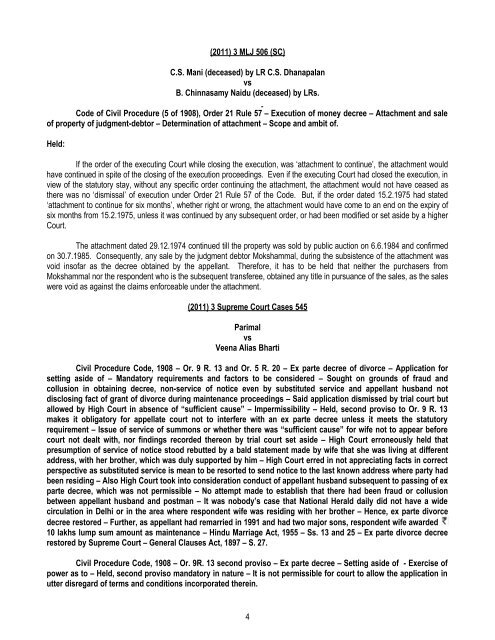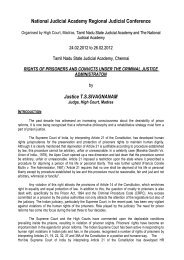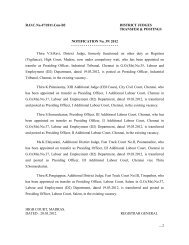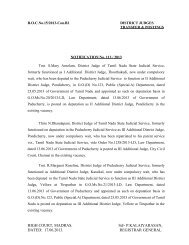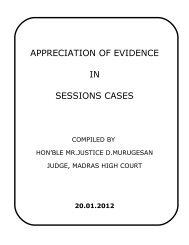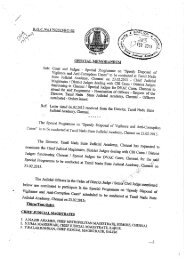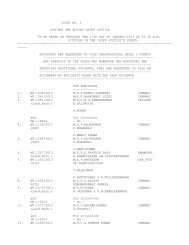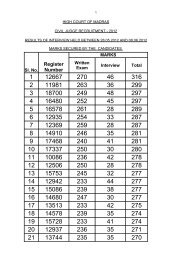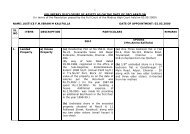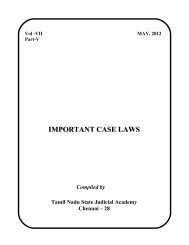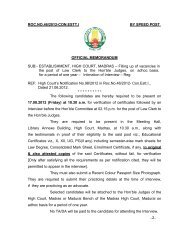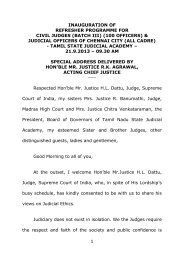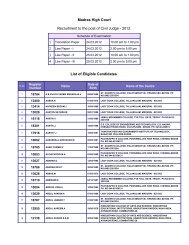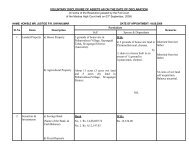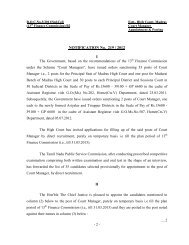IMPORTANT CASE LAWS - Madras High Court
IMPORTANT CASE LAWS - Madras High Court
IMPORTANT CASE LAWS - Madras High Court
Create successful ePaper yourself
Turn your PDF publications into a flip-book with our unique Google optimized e-Paper software.
(2011) 3 MLJ 506 (SC)<br />
C.S. Mani (deceased) by LR C.S. Dhanapalan<br />
vs<br />
B. Chinnasamy Naidu (deceased) by LRs.<br />
Code of Civil Procedure (5 of 1908), Order 21 Rule 57 – Execution of money decree – Attachment and sale<br />
of property of judgment-debtor – Determination of attachment – Scope and ambit of.<br />
Held:<br />
If the order of the executing <strong>Court</strong> while closing the execution, was ‘attachment to continue’, the attachment would<br />
have continued in spite of the closing of the execution proceedings. Even if the executing <strong>Court</strong> had closed the execution, in<br />
view of the statutory stay, without any specific order continuing the attachment, the attachment would not have ceased as<br />
there was no ‘dismissal’ of execution under Order 21 Rule 57 of the Code. But, if the order dated 15.2.1975 had stated<br />
‘attachment to continue for six months’, whether right or wrong, the attachment would have come to an end on the expiry of<br />
six months from 15.2.1975, unless it was continued by any subsequent order, or had been modified or set aside by a higher<br />
<strong>Court</strong>.<br />
The attachment dated 29.12.1974 continued till the property was sold by public auction on 6.6.1984 and confirmed<br />
on 30.7.1985. Consequently, any sale by the judgment debtor Mokshammal, during the subsistence of the attachment was<br />
void insofar as the decree obtained by the appellant. Therefore, it has to be held that neither the purchasers from<br />
Mokshammal nor the respondent who is the subsequent transferee, obtained any title in pursuance of the sales, as the sales<br />
were void as against the claims enforceable under the attachment.<br />
(2011) 3 Supreme <strong>Court</strong> Cases 545<br />
Parimal<br />
vs<br />
Veena Alias Bharti<br />
Civil Procedure Code, 1908 – Or. 9 R. 13 and Or. 5 R. 20 – Ex parte decree of divorce – Application for<br />
setting aside of – Mandatory requirements and factors to be considered – Sought on grounds of fraud and<br />
collusion in obtaining decree, non-service of notice even by substituted service and appellant husband not<br />
disclosing fact of grant of divorce during maintenance proceedings – Said application dismissed by trial court but<br />
allowed by <strong>High</strong> <strong>Court</strong> in absence of “sufficient cause” – Impermissibility – Held, second proviso to Or. 9 R. 13<br />
makes it obligatory for appellate court not to interfere with an ex parte decree unless it meets the statutory<br />
requirement – Issue of service of summons or whether there was “sufficient cause” for wife not to appear before<br />
court not dealt with, nor findings recorded thereon by trial court set aside – <strong>High</strong> <strong>Court</strong> erroneously held that<br />
presumption of service of notice stood rebutted by a bald statement made by wife that she was living at different<br />
address, with her brother, which was duly supported by him – <strong>High</strong> <strong>Court</strong> erred in not appreciating facts in correct<br />
perspective as substituted service is mean to be resorted to send notice to the last known address where party had<br />
been residing – Also <strong>High</strong> <strong>Court</strong> took into consideration conduct of appellant husband subsequent to passing of ex<br />
parte decree, which was not permissible – No attempt made to establish that there had been fraud or collusion<br />
between appellant husband and postman – It was nobody’s case that National Herald daily did not have a wide<br />
circulation in Delhi or in the area where respondent wife was residing with her brother – Hence, ex parte divorce<br />
decree restored – Further, as appellant had remarried in 1991 and had two major sons, respondent wife awarded<br />
10 lakhs lump sum amount as maintenance – Hindu Marriage Act, 1955 – Ss. 13 and 25 – Ex parte divorce decree<br />
restored by Supreme <strong>Court</strong> – General Clauses Act, 1897 – S. 27.<br />
Civil Procedure Code, 1908 – Or. 9R. 13 second proviso – Ex parte decree – Setting aside of - Exercise of<br />
power as to – Held, second proviso mandatory in nature – It is not permissible for court to allow the application in<br />
utter disregard of terms and conditions incorporated therein.<br />
4


